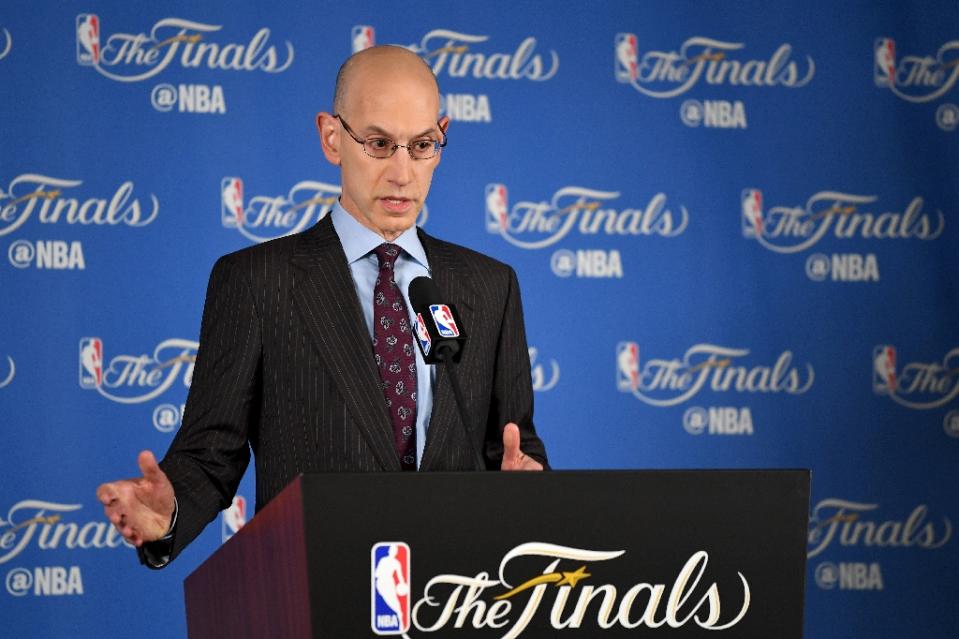Adam Silver doesn't love the 1+1 deals signed by LeBron and Durant

One of the weirdest things about Kevin Durant’s decision to leave the Oklahoma City Thunder for the Golden State Warriors is that he’s not committed to his new club past the 2016-17 season. Durant signed a two-year deal with Golden State that includes a player option on the second season, and no one believes he’ll actually accept it. That will make Durant a free agent when he has 10 years of service and the salary cap jumps to over $100 million, at which point he will be able to sign a contract that could total more than $200 million.
[Follow Dunks Don’t Lie on Tumblr: The best slams from all of basketball]
LeBron James has signed similar deals with the Cleveland Cavaliers in each of the past two offseasons, and he figures to do the same thing in upcoming weeks in advance of getting his own record-shattering contract next summer. James and Durant are the only two players who have pursued this long-term strategy — in fact, only a handful of stars would even consider the same, let alone choose it.
Nevertheless, commissioner Adam Silver has a problem with it. From Joe Vardon of Cleveland.com:
“One of the unintended consequences (of doing contracts like James) I feel on behalf of the players is the fact that they end up putting themselves in this position where they’re taking enormous financial risk,” NBA commissioner Adam Silver told cleveland.com. “The system is designed for guys to enter into long term contracts, so, and you can only get so much insurance. So one of the unintended consequences is they take risk beyond what we would like to see them take.
“The other thing is, the system is designed and incentivizes players to stay with the same teams,” Silver said. “At the same time I respect free agency so if they make those decisions to leave, that’s fine too. But as I said, I’d like to talk to the union about maybe modifying the system so there’s a little bit more of an incentive to stay with your existing team.”
Silver’s comments cover several different levels of this issue, so they should not be reviewed as a whole. First, his point about the financial risk of a 1+1 deal doesn’t really apply to top-level superstars like LeBron and KD, because each miss a full season due to injury and still have every team in the league want to offer a full max contract. They have sacrificed contract years for the right to make as much money as possible over the long term and exert some level of control over the teams that employ them. Especially in the case of LeBron, the one-year deal gives a true superstar leverage and power. Dwyane Wade and Pau Gasol were the only other 1+1 contracts this summer because such a deal usually only becomes attractive to an older player who expects to be paid a certain amount each season (like Wade) or an aging star who wants the flexibility to jump from team to team (like Gasol).
However, Silver has some reason to think that the 1+1 deal will become more common. While LeBron is without peer in terms of the power he has in his organization, enough players have followed his attempts to construct star-laden super teams (whether successfully or not) that it’s not way off to imagine that other All-Stars could choose to keep their teams accountable with their own successive one-year deals. In the same way that small-market teams like the Memphis Grizzlies give max contracts to guys like Chandler Parsons because no better options are on hand, franchises could offer similar control to their homegrown stars in the hopes of keeping them in town for one more season. It’s not clear that sub-superstar players would want to take those risks, but the market is such that they may still be able to get very lucrative deals even after serious injury.
On the other hand, it’s not clear that signing short-term contracts contradicts Silver’s stated goal of getting players to stay with their current teams in free agency. It’s even possible to view this option as a way to get players to stay in town longer than they might otherwise choose. If a player is wary of committing to a struggling franchise long-term, why wouldn’t he sign for one more year to keep his options open while also exercising some loyalty?
As LeBron and other superstars have shown, it’s possible to mold the existing rules to fit a unique set of preferences. No one thought that a 1+1 deal would be desirable until James and Durant showed that it could be. This generation of superstars is creative enough to find leverage in all sorts of circumstances.
– – – – – – –
Eric Freeman is a writer for Ball Don’t Lie on Yahoo Sports. Have a tip? Email him at efreeman_ysports@yahoo.com or follow him on Twitter!

 Yahoo Sports
Yahoo Sports 

